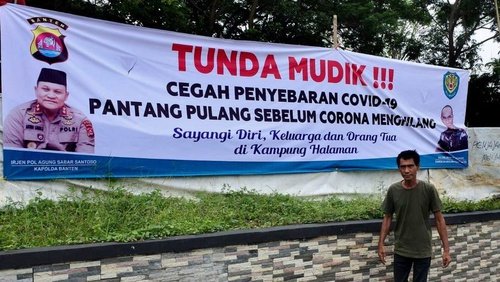Prohibition of Homecoming Effectively Minimizes the Spread of Covid-19
By: Reza Pahlevi )*
Homecoming behavior increases the mobility of the people living in the red zone to their hometown areas. Travelers from the red zone became the media for the spread of Covid-19. For this reason, the existence of a ban on going home policy can reduce Covid-19 to spread throughout Indonesia.
A researcher at the Eijkman Oxford Clinical Research Unit, Iqbal Elyazar said that the ban on going home was an effort that had a positive impact, because this could help design the impact scenario of Covid-19 in the foreseeable future.
The results of this homecoming ban cannot be felt instantly. After walking one week, two weeks and so on, there will be a cause and effect scenario if the community complies or violates the prohibition policy.
Cooperation from the community will realize this policy has a very large share. That way, the level of effectiveness of this policy can be measured.
Indonesia, a country that consists of many islands, has massive connectivity. Land and air travel in Indonesia tend to take place a lot in the west and center. Whereas the eastern part mostly uses sea travel.
Some time ago, President Joko widodo has inaugurated a ban on going home and will continue to be tightened, even to the point of sanctions. Because, there are still many people who go home and do not comply with these rules.
That way, the government is preparing regulations in the transportation sector to support the implementation of the policy of prohibition of going home. Director General of Land Transportation of the Ministry of Transportation, Budi Setiyadi, said that the scheme that had been prepared by the government was in the form of a ban on public transportation, private vehicles and motorcycles entering and entering the red zone area of Covid-19.
This traffic restriction scenario was chosen because the prohibition on traffic was limited to passenger transport, while freight and logistics continued to operate as usual.
Head of the Covid-19 Task Force Accelerating Task Force Acceleration Team Wiku Adisasmito said based on the results of research conducted by a number of institutions and researchers that the prediction of the peak of the Covid-19 outbreak in Indonesia in early May to early June. Conditions for the continued spread of the virus must be considered by all parties, so that this spread can be stopped.
Efforts to ban homecoming for the community will be effective when obeyed. By minimizing the spread of Covid-19, it is hoped that this pandemic will soon end and community activities can return to normal.
The community does not need to worry about the fear of not being able to stay in touch with their families in the village. Because the government has replaced the Idul Fitri leave on May 26-29 to 28-31 December 2020.
The decision to shift the joint leave was agreed by the Minister of Administrative Reform and Bureaucratic Reform, the Minister of Religion, and the Minister of Manpower.
The government has made various efforts to prevent the spread of Covid-19. For this reason, there needs to be an active role of the community in complying with all policies determined by the government solely to safeguard the welfare of the people.
The wider the spread of the virus is overcome, the greater the impact on the health, economy and social activities of the community.
The government predicts that economic growth in 2020 is likely to experience a decline of 2.3 percent from the 5.3 percent target due to the widespread Covid-19. The worst possibility is negative economic growth if the spread of the Covid-19 pandemic is not resolved immediately.
The government and society and all people in the world certainly hope that the Covid-19 pandemic will soon end so that it can be active and return to its previous life. For this reason, there is a need for cooperation from all parties to participate in the prevention of Covid-19 and to comply with all policies that have been determined.
)* The writer is a student of the University of Pakuan Bogor
